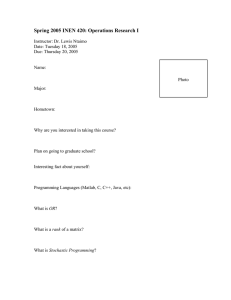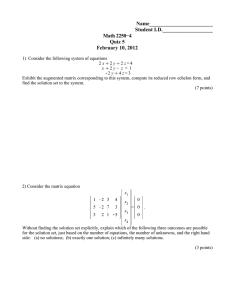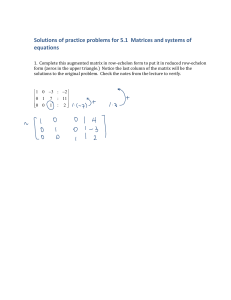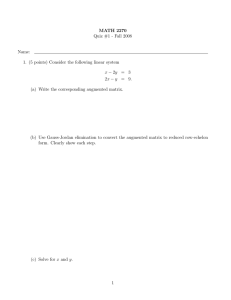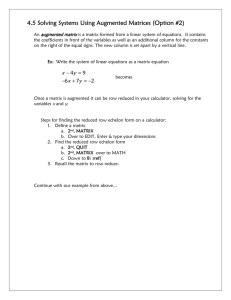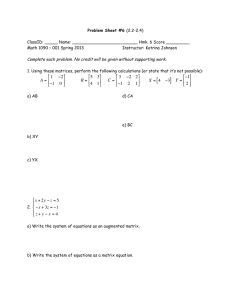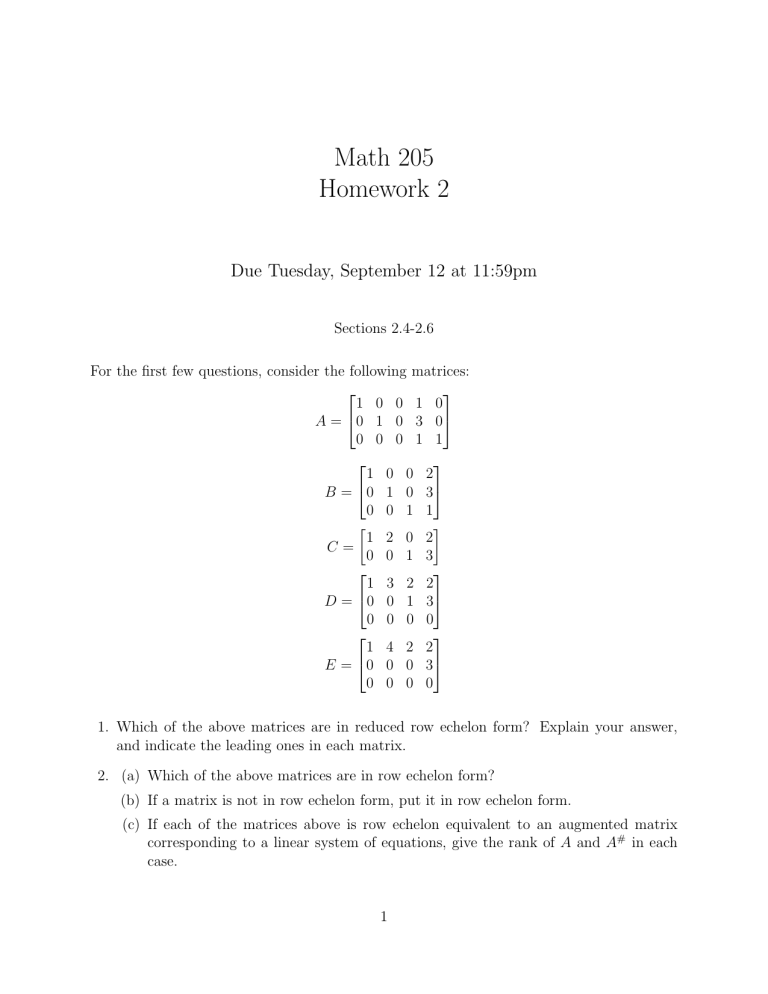
Math 205 Homework 2 Due Tuesday, September 12 at 11:59pm Sections 2.4-2.6 For the first few questions, consider the following matrices: 1 0 0 1 0 A = 0 1 0 3 0 0 0 0 1 1 1 0 0 2 B = 0 1 0 3 0 0 1 1 1 2 0 2 C= 0 0 1 3 1 3 2 2 D = 0 0 1 3 0 0 0 0 1 4 2 2 E = 0 0 0 3 0 0 0 0 1. Which of the above matrices are in reduced row echelon form? Explain your answer, and indicate the leading ones in each matrix. 2. (a) Which of the above matrices are in row echelon form? (b) If a matrix is not in row echelon form, put it in row echelon form. (c) If each of the matrices above is row echelon equivalent to an augmented matrix corresponding to a linear system of equations, give the rank of A and A# in each case. 1 3. (a) If each of the above matrices is an augmented matrix corresponding to a linear system of equations, how many solutions does each system have? (b) Summarize in your own words when an augmented matrix is put in row echelon form, what does it look like if the system has no solutions? Infinitely many solutions? A unique solution? Do NOT use rank in your answer. (c) Keeping your previous answer in mind, explain why the following theorem from your textbook is true: Consider the m × n linear system Ax = b. Let r denote the rank of A, and let r# denote the rank of the augmented matrix of the system. Then 1. If r < r# , the system is inconsistent. 2. If r = r# , the system is consistent and • There exists a unique solution if and only if r# = n. • There exists an infinite number of solutions if and only if r# < n. 4. (a) Find the solution set to the following system of linear equations using Gauss-Jordan elimination: y + 3z = 5 x + 2y − 3z = −6 x + 2y = 0 (b) If we leave out the last equation we get the following linear system: y + 3z = 5 x + 2y − 3z = −6 What is the solution set of this linear system? How has the solution set changed after removing one equation? Check: The rank of the augmented matrix associated to the system is exactly 2. 5. Find the solution set to the following system of linear equations using Gauss-Jordan elimination: 2x − 2y = 2 2x − y + 3z = 2 4x − 3y + 3z = 5 What is the rank of the corresponding coefficient matrix? What is the rank of the augmented matrix? Why does this make sense, given your solution set and the number of variables? Check: The ranks are unequal. Page 2 6. (a) Find the solution set to the following system of linear equations using Gauss-Jordan elimination: x + 2y = 3 4x + 5y = 6 7x + 8y = 9 What is the rank of the corresponding coefficient matrix? Check: A solution to the system is in the plane x = −1. (b) How would the solution set change if we removed the last equation from the linear system? In other words, what is the solution set of the following system? x + 2y = 3 4x + 5y = 6 Check: The rank of the corresponding augmented matrix is 2. 7. Find the solution set to the following system of linear equations using Gauss-Jordan elimination: 4x + y + 2z = 3 −x + 0y + 0z = −1 4x + 2y + 4z = 2 8. Find the solution set to the following system of linear equations using Gauss-Jordan elimination: 2x + 6y + 3z + 2v + 17w = 7 3x + 8y + 3z + 2v + 22w = 2 x + 2y + z + 6w = 0 What is the rank of the corresponding coefficient matrix? Check: The solution set is contained in the plane z = 5. 9. (a) Find the inverse of the matrix 1 0 −1 0 A= 5 2 1 1 2 using Gauss-Jordan elimination. Page 3 Check: Make sure that your resulting matrix is indeed the inverse by multiplying it with A and checking if you get the identity matrix. (b) Let 2 Ax = 1 . 0 Explicitly write out the corresponding system of equations. Use the inverse you computed above to find the unique solution of the system of linear equations. Check: The solution set lies in the plane x3 = 5. 3 1 2 4 10. Consider A = and B = . −1 0 1 1 (a) Find the inverses A−1 and B −1 . (b) Use the result of (a) to compute (AB)−1 . Check: The top, right corner of (AB)−1 is 13/2. 11. For which number k is the matrix −2 −3 −3 1 1 1 3 −3 k not invertible? Justify your answer. 12. Let A be an n × n matrix such that A2 = I, the identity matrix. What is A−1 ? What is the rank of A? Page 4
